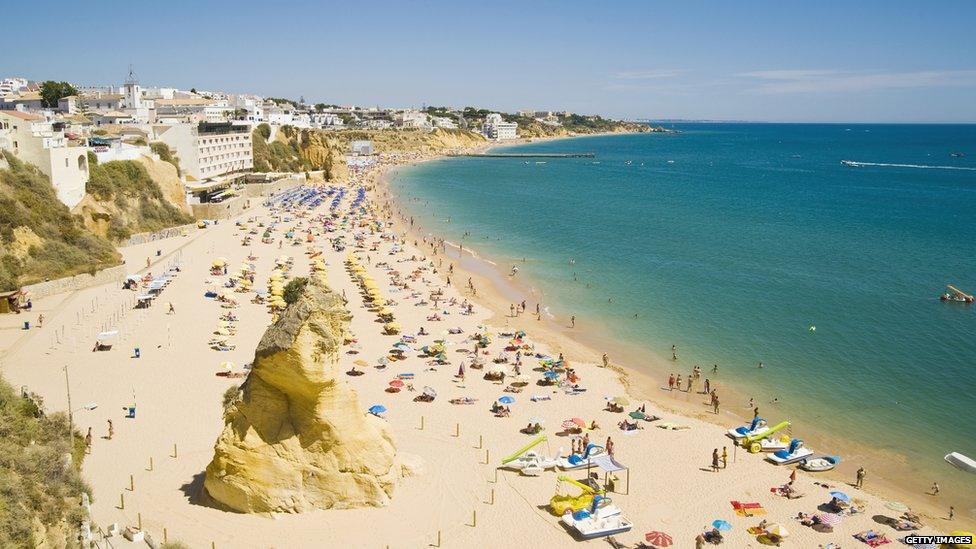Coronavirus: Switzerland latest to join UK's quarantine list
- Published
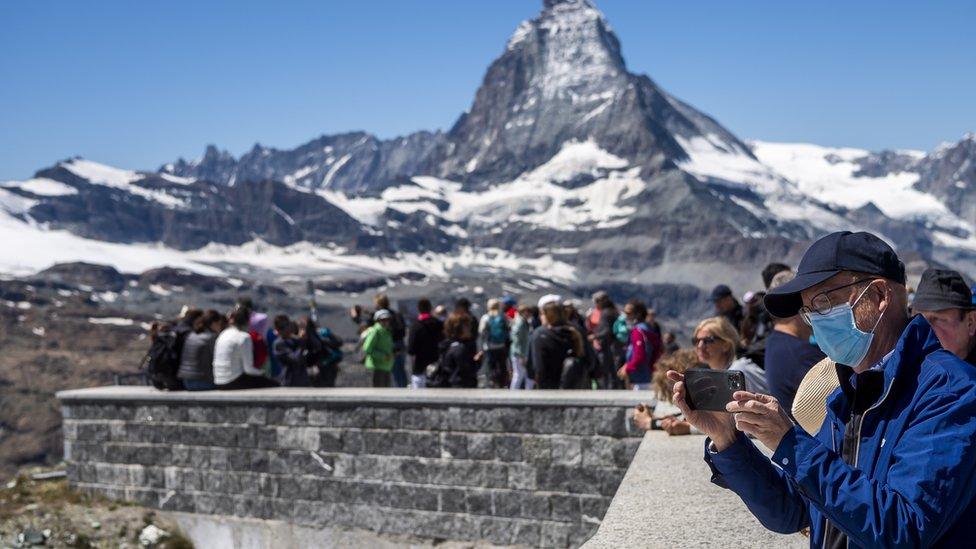
Tourists wearing face coverings visit Switzerland's Matterhorn mountain
Travellers to Switzerland, Jamaica and Czech Republic who return to the UK from 04:00 BST on Saturday will have to self-isolate for two weeks.
The UK government said the move was needed to keep UK infection rates down.
People arriving in Scotland from Switzerland are already required to self-isolate.
Cuba, where there has been a drop in cases, will be added to the list of destinations people can return from without entering quarantine.
The UK considers imposing quarantine conditions when a country's rate of infection exceeds 20 cases per 100,000 people over seven days.
The government said there has been a "consistent increase" in the weekly case rate in Switzerland, external over the past four weeks, with cases per 100,000 rising from 18.5 to 22 over the past week.
In Jamaica, the seven-day rate rose from 4.3 on August 20 to 20.8 on Thursday - a 382% increase, while the Czech Republic has seen weekly cases per 100,000 rise from 16.2 on 20 August to 20.2 on Thursday.
More than 1.6 million Britons travelled to Switzerland last year, the Swiss Tourism Federation said, drawn by the Alps and the mountain air.
The Czech Republic sees more than 300,000 British tourists every year, according to the Foreign and Commonwealth Office. The capital Prague is a popular destination for city breaks and stag parties.
Katarina Hobbs, director of CzechTourism UK and Ireland, insists the country "remains a safe country to travel to", adding she hoped the British government would reconsider its decision "very soon".
Coronavirus: How to fly during a global pandemic (this video reflects the rules before the hotel quarantine was introduced in the UK)
The Foreign Office is now advising against all but essential travel to the Czech Republic, Jamaica and Switzerland.
UK tourists in those countries are being told to follow local rules and check the FCO travel advice.
In a tweet, external, Transport Secretary Grant Shapps warned British holidaymakers to "only travel if you are content to unexpectedly 14-day quarantine on return".
People wishing to avoid the need to self-isolate now face a race to get back to the UK before the quarantine deadline.
Simon Calder, travel editor of the Independent, told the BBC fares "went through the roof" within minutes of No 10's announcement, with airlines including British Airways adding extra flights to Heathrow from Prague, Geneva and Zurich priced at about "£300 one way".
He also wrote in the Independent, external, that a "significant number" of UK tourists with family connections to Jamaica were understood to be on the Caribbean island but warned it might be too late for them to return by Saturday's deadline if they missed Thursday's overnight flights - which go through America.
He advised travellers leaving Switzerland to avoid flying via Basel airport as its terminal and runway sat inside French territory, and, according to the DfT, would trigger the need to quarantine.
Liechtenstein is now also off-limits, he added, because it is only accessible through Switzerland and Austria - which is also on the government's quarantine list.
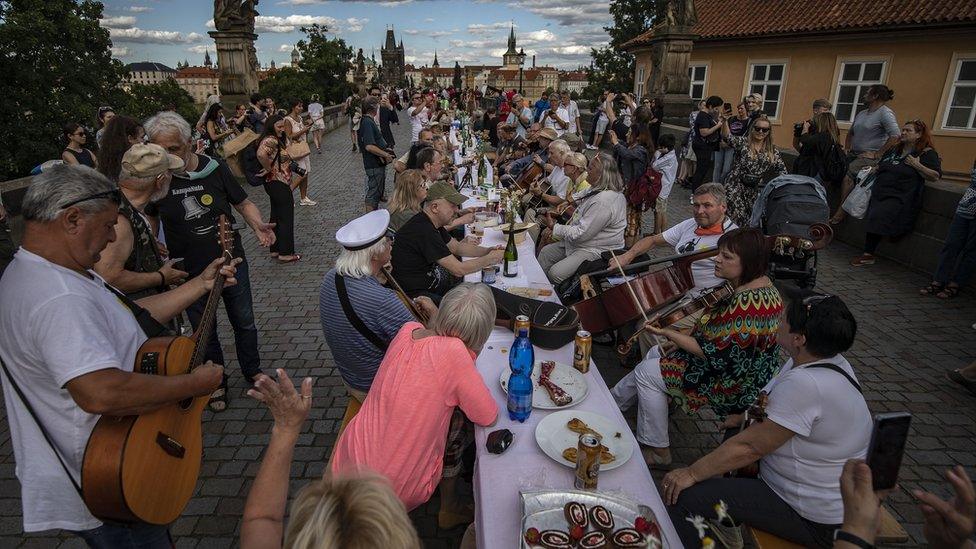
The Czech Republic loosened its lockdown restrictions in July
In July, thousands of guests sat at a 500 metre-long (1,640ft) table on the Charles Bridge in Prague at a party held to give the coronavirus a "symbolic farewell".
The event's organiser said the celebration in the Czech capital was made possible by a lack of tourists in the city.
In Switzerland, a state of emergency was declared in March, with the government ordering the closure of schools, restaurants, bars and all the ski slopes.
But by June, as cases of Covid-19 started to fall across Europe and more travel was permitted, it reopened its mountain railways and cable cars.

'Lockdown decimated our bookings'
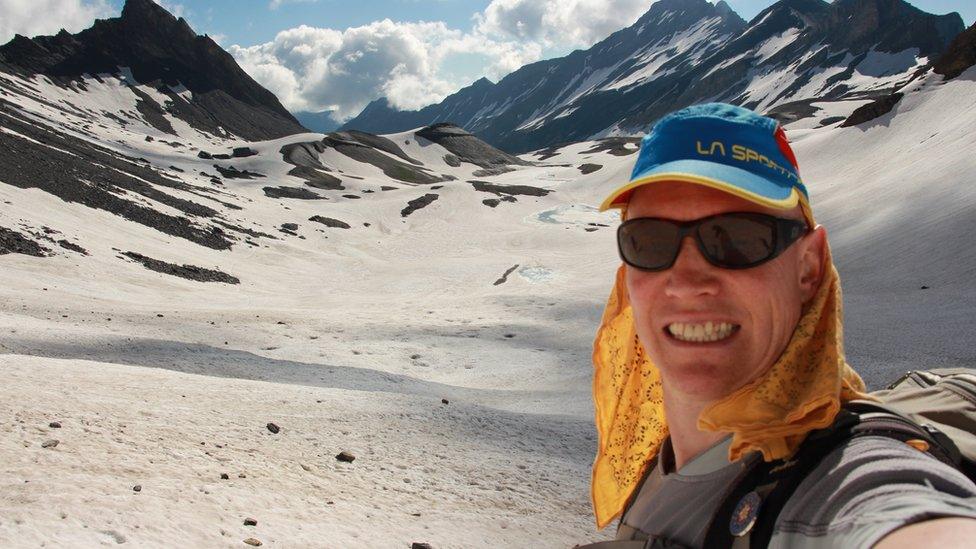
Tom Brodie, who lives in the Rhone Valley in Switzerland, set up his own adventure travel business in January before coronavirus restrictions "decimated" his summer season and he had to refund his bookings.
Mr Brodie, originally from Birkenhead, Wirral, recently re-launched Alps Adventures - which gets most of its business from the UK - but now fears people will cancel their winter bookings if Switzerland remains on the quarantine list.
He says he is trying to see the "silver linings", including flights being cheaper in the winter, but admits it will be "very tough" as no-one will want to book flights now.
Meanwhile, Julian Griffiths is driving back from Switzerland, where he lives, a week earlier than planned to get his daughter back to the UK for the start of the new school term.
He questioned whether he was more at risk of catching coronavirus in Switzerland than in the UK.
"I think the number of cases is based on the level of testing," he told BBC Radio 4's Today programme.
"When I had a test for Covid, I just went to my local doctor's, he did the test, gave me the results 10 minutes later, and it's the same for anybody in Switzerland."

Quarantine rules are set by each UK nation separately, but the DfT said equivalent measures were being put in place in Northern Ireland, Scotland and Wales.
Wales has made one further change - adding Singapore to its list of exemptions.
Gibraltar remains on the UK's quarantine exemption list despite concern about a rising number of Covid cases.
Last week restrictions were lifted on those returning from Portugal but added for travellers coming back from Croatia, Austria and Trinidad and Tobago.
In July, travellers returning to the UK from Spain were caught out by the government's decision to advise against all but non-essential travel to the mainland and islands after a spike in cases in the country.
And two weeks ago, visitors to France were given a few days' notice that they would face a quarantine on their return home to the UK.


On their own, the three latest countries to join the UK's quarantine list won't affect a huge number of people.
But over the past month, the government has scrapped so-called travel corridors - meaning people don't have to self-isolate - with at least 18 countries and territories, including key tourist destinations like France and Spain.
Ministers say this cautious approach will prevent cases of the virus being imported.
However, travel companies are frustrated that the UK hasn't yet followed countries like France and Germany and set-up a testing regime for passengers arriving from "at risk" countries, so that people who test negative can leave quarantine early.
The UK government is said to be considering a two-test regime whereby passengers would test on arrival and then go into quarantine for eight days until a second test. Two negative results would mean they would avoid the remaining six days of quarantine.
Figures within the aviation sector say that approach is too cautious and would do little to kick-start foreign travel.

There has been widespread criticism of the government's weekly reviews of travel restrictions.
The editor of Which? Travel, Rory Boland, said many holidaymakers found themselves "held to ransom" by airlines when trying to purchase new flights to beat the quarantine deadlines.
He called for greater transparency from the government so people had the necessary information in advance to decide whether it was safe to travel.
"Struggling tour operators can offer them trips to alternative destinations, rather than facing the financial hit of yet more cancellations and refund pay-outs," he added.
Meanwhile, airport operator the Manchester Airport Group has called for an end to the UK's "sluggish, illogical and chaotic" approach to quarantine.
Its chief strategy officer, Tim Hawkins, said: "These decisions aren't being made anywhere near quick enough".
The Association of Travel Agents and Tour Operators (Abta) warned the travel sector would "continue to suffer" for as long as quarantine remains the government's "principal strategy" in containing the virus.
A spokesperson said it was "vital" for the government to "assess risk on a regionalised" basis - allowing travel to areas in a country unaffected by a spike in cases - rather than a blanket one, in order to minimise the impact on the sector and consumer confidence.

Have you been affected by the quarantine announcement? Share your experiences by emailing haveyoursay@bbc.co.uk, external.
Please include a contact number if you are willing to speak to a BBC journalist. You can also get in touch in the following ways:
WhatsApp: +44 7756 165803
Tweet: @BBC_HaveYourSay, external
Please read our terms & conditions and privacy policy
If you are reading this page and can't see the form you will need to visit the mobile version of the BBC website to submit your question or comment or you can email us at HaveYourSay@bbc.co.uk, external. Please include your name, age and location with any submission.
- Published26 August 2020
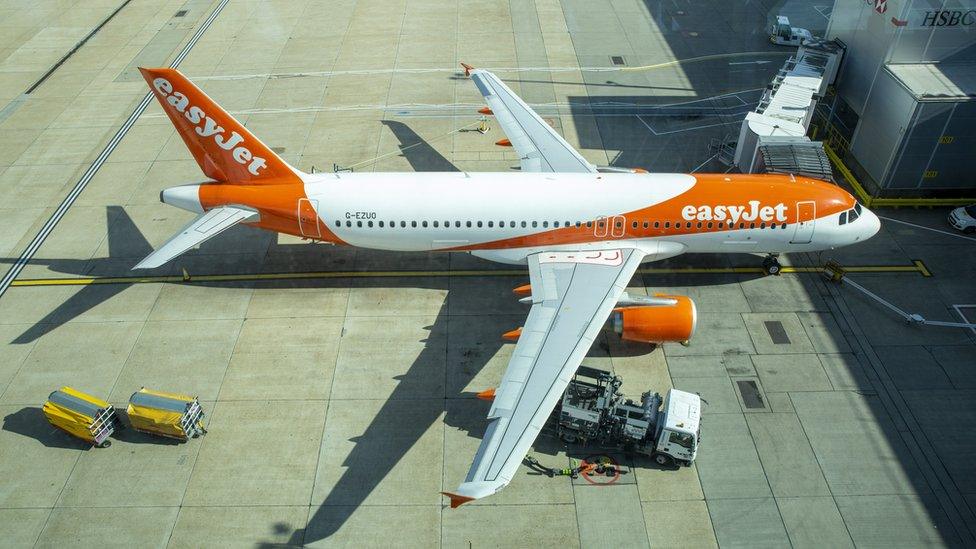
- Published20 August 2020
